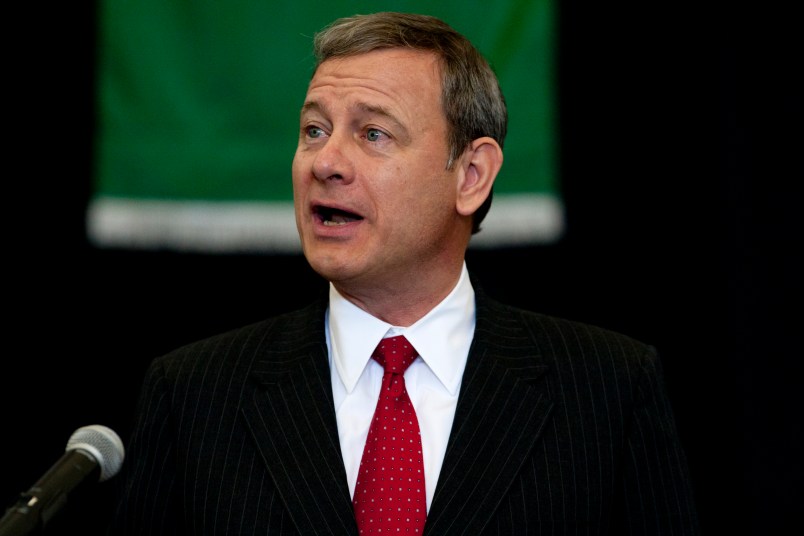Skeptics of the legal challenge to Obamacare’s birth control mandate warn that a ruling against it could declare open season on virtually any law that a person or business can mount a religious-based objection to. If Hobby Lobby can be exempt because of its owners’ Christian beliefs, Justice Elena Kagan wondered, what legal principle would stop other corporations from seeking religious-based exemptions from minimum wage or sex discrimination laws?
Chief Justice John Roberts, expressing deep skepticism toward the contraceptive mandate during Supreme Court arguments on Tuesday, offered conservatives a way out of that dilemma. He contended that “closely held” businesses, like Hobby Lobby and Conestoga Wood, who brought the case, could be given that option without opening the same door for publicly owned companies.
Roberts was responding to U.S. Solicitor General Donald Verrilli’s attempt to rebut a claim by the challengers’ lawyer that judges would have more latitude to doubt the sincerity of religious objections mounted by a public company.
“Well, that’s his argument for distinguishing it,” said the chief justice. “But there are others, including the fact that you avoid all of the problems with what to do if there’s a percent ownership of the shareholders, if you simply say that it’s in this type of Chapter S Corporation that is closely held. Whether it applies in the other situations is a question that we’ll have to await another case when a large publicly-traded corporation comes in and says, we have religious principles — the sort of situation I don’t think is going to happen.”
Lyle Denniston, a legal expert at the respected SCOTUSblog, observed that Roberts was “seeming to look for a way to rule narrowly for corporations” and “suggested that the case might be decided by finding such protection only for corporations that are owned by a tightly limited group of shareholders.”
Paul Clement, the lawyer for the plaintiffs, seemed happy to give justices that option. “It is no accident that the claims that you have before you in these cases are brought by small closely-held corporations that have firmly held religious beliefs,” he said.
Roberts suggested that he believes Hobby Lobby and Conestoga Wood can bring forth claims of religious freedom, saying courts have held that “corporations can bring racial discrimination claims as corporations” and that “those cases involve construction of the term ‘person.'”
The outcome of the case remains unclear as the court appeared sharply divided. Justice Anthony Kennedy, the likely swing vote based on the line of questioning, expressed some sympathy for female employees helped by the mandate but voiced plenty of doubts about its validity. The prospect of a narrow ruling granting religious rights to “closely held” corporations was also floated by legal reporters at NPR, Reuters and the Los Angeles Times.
“Chief Justice Roberts appeared to tip his hand when he told Mr. Verrilli that the parade of horribles — all kinds of religious exemptions being claimed by all sorts of employers, punching holes in the uniform application of the laws — could be avoided by a ruling limited to closely held enterprises, like S corporations that pass their earnings through to their shareholders,” wrote Jess Bravin of the Wall Street Journal. “That would leave the issue of, say, an Exxon claiming religious freedom rights to another day.”






